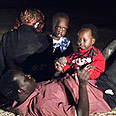1,000 Africans estimated to have infiltrated Israel in 2 weeks
Some 10,000 refugees enter Israel through Sinai over past five years; only 600 infiltrators from Darfur receive official refugee status, while 2,000 refugees from Eritrea receive permanent status. Others live in deplorable conditions, some become involved in crime
According to police and IDF estimates, some 10,000 people have entered Israel from Africa over the past five years through the Egyptian border. The breached border has made the infiltration very simple.
Hundreds of thousands of African refugees are living in Egypt and being pursued by the authorities, causing some of them to move on toe Sinai and into the Negev.
According to official sources, infiltrators failed to enter Israel for several weeks due to the tight security imposed while the Philadelphi route was breached. The Egyptians have been attempting to stop the infiltrators from crossing the border, and in several incidents have even shot African refugees to death, but usually fail to deal with the stream of refugees.
Most infiltrators live in Israel illegally. They have no medical insurance and no social benefits. Most of them work, however, and are also aided by human rights organizations like the Hotline for Migrant Workers.
Most of the refugees live in southern Israel, in the Negev and Eilat, while some live in Tel Aviv and central Israel. Some manage to rent apartments, while some live on the streets.
According to the police, many of the refugees are involved in criminal activities. About 700 infiltrators are being detained at the Ketziot Prison until the State decides what to do with them. Officially, they should be deported by security forces back to Egypt, but in practice this is impossible as they will return through the breached border.
'A national disaster'
Some 600 Sudanese infiltrators, who escaped from Darfur where hundreds of thousands of people have been murdered in a civil war, have received an official refugee status, which is granted following a government decision according to a United Nations recommendation.
These refugees received a temporary resident ID which grants them and their children a legal work permit, medical insurance, and six months later – social benefits as well.
Another 2,000 infiltrators, who arrived from Eritrea, also received temporary resident IDs, for "humanitarian" reasons according to the government, but not as refugees. These are people who escaped the war between Eritrea and Ethiopia, but diplomatic sources say that Israel refuses to recognize them as refugees due to the Jewish state's good relations with both African countries.
The stay permits are only given to those who infiltrated Israel from Eritrea by December 25, 2007. Officially, all those who arrived after that date are considered illegal residents.
Some 400 new infiltrators arrived Sunday at the UN offices in Tel Aviv seeking a similar status to that given to the pervious infiltrators. Infiltrators from other countries, such as Ghana and Ivory Coast, as well as from Egypt and the other parts of Sudan, are not eligible to any status.
Shmuel Rifman, head of the Ramat Hanegev Regional Council, told Ynet that the large majority of the refugees came to Israel became the average monthly salary in Egypt is $10, while in Israel it stands at $1,000.
"I warned the government a year ago from a flourishing 'wave of immigration'. These 1,000 are only the refugees counted, but the IDF fails to reach all areas. There is a huge gap between the IDF's reports and what happens in practice.
"I view this as a national disaster. The decision makers fail to understand the meaning of this. This will be the number one social problem in the next decade. Some 200,000 are sitting in Egypt, waiting to receive wages in the Holy Land. As far as they are concerned, this is the Promised Land.
"People think they are only Darfur refugees, but those are only a few. The danger concealed in those looking for work is even greater than the danger of terrorists infiltrating Israel," he noted.
And what is the government doing? According to Rifman, "Besides talking, the government has not done a thing on this matter. I am unfamiliar with any plan, and I know about plans. The State of Israel must place the fence, because eventually, dealing with all the problems created as a result of the large number of job hunters will cost much more. This is not only a security problem, but an economic one as well."
Beersheba Mayor Yaakov Turner said, "The absent separation fence is one of the main causes of our strike on Wednesday and the demonstrations. The State has abandoned the south. There is no border and no fence between Sinai and the south, and the fence in southern Mount Hebron has not been completed.
"We received a grave message in Dimona. It is impossible to know how many of the 1,000 refugees crossing the border have bad intentions and constitute a danger to Israel. If the State of Israel fails to pull itself together, we will pay the price."
Roni Arison contributed to this report

















